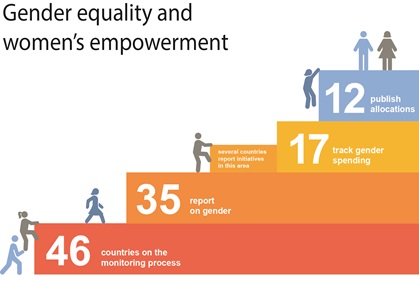Gender equality and development
Development effectiveness and gender equality
The GENDERNET has had a long-term engagement with the aid and development effectiveness agenda. It supports donor agencies to improve their development results through a better integration of gender equality into all areas of their development co-operation.
The Busan principles for aid effectiveness
The Busan Partnership agreement adopted at the Fourth High-Level Forum on Aid Effectiveness (2011) highlights a set of common principles for all development co-operation actors, which are considered as key to making development co-operation effective:
- Ownership of development priorities by developing countries.
- Focus on results
- Inclusive development partnerships
- Transparency and mutual accountability.
The Busan Partnership agreement also recognised, inter alia, the need to “accelerate [our] efforts to achieve gender equality and the empowerment of women through development programmes grounded in country priorities, recognising that gender equality and women’s empowerment are critical to achieving development results” (para. 20).
Monitoring the Busan commitments: the Global Partnership for Effective Development Co-operation indicator on gender equality
The Global Partnership for Effective Development Co-operation (GPEDC) was established to help ensure accountability for implementation of the Busan commitments. The GENDERNET and UN Women supported the development of the GPEDC indicator on gender equality (indicator 8) – one of just 10 indicators to track implementation of the Busan commitments. This indicator measures the proportion of developing countries with systems to track and make public allocations for gender equality. It is a tool to help ensure that domestic resource allocation is gender-responsive and to strengthen accountability and transparency financing for gender equality.
The first progress report of the Global Partnership on the implementation of the Busan commitments (2014) found that out of 35 countries that reported on the indicator, 12 have systems to track and make public allocations in support of gender equality. Additionally, 5 countries reported systems for tracking allocations but these allocations were not made public. The second monitoring round of the GPEDC is currently underway and data is being collected for the 10 indicators. This will help generate evidence about progress achieved since Busan. Findings will feed into the Second High-Level Meeting of the GPEDC which will take place from 28 November-1 December 2016 in Nairobi, Kenya.
|
Results for indicator 8 in the first monitoring round of the GPEDC (2014):
|
 |